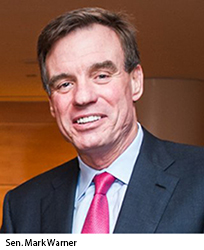
Sen. Warner: ‘Put the Old Band Back Together’ for GSE Reform
WASHINGTON, D.C.–Sen. Mark Warner, D-Va., never wanted to know as much about housing finance as he does now.
 “But Sen. Bob Corker [R-Tenn.] and I felt a number of years back that the one piece of unfinished business [after the financial crisis] was housing finance and not continuing the system that during good times the private sector gains, but during rough times the public sector pays,” Warner said here at the Mortgage Bankers Association National Advocacy Conference.
“But Sen. Bob Corker [R-Tenn.] and I felt a number of years back that the one piece of unfinished business [after the financial crisis] was housing finance and not continuing the system that during good times the private sector gains, but during rough times the public sector pays,” Warner said here at the Mortgage Bankers Association National Advocacy Conference.
Warner noted that the Corker-Warner government-sponsored enterprise reform proposal was ultimately unsuccessful. “But that was not due to a lack of support from the Mortgage Bankers Association,” he said. “I appreciate your collaboration, coordination and cooperation when we tried.”
Warner said he and Corker “decided that we’d put the old band back together” now that there is a new presidential administration. “We recognized that there is unfinished business to be done,” he said. “Corker and I have been meeting for some time and we’ve found genuine interest from the administration–Treasury Secretary Steve Mnuchin has a deep background in housing finance–and Senators [Mike] Crapo [R-Idaho] and [Sherrod] Brown [D-Ohio] are interested as well,” he said.
Warner noted that housing makes up 20 percent of the U.S. economy. “The current status quo of conservatorship is not sustainable over the long haul,” he said. “We’re only one slight downturn away from either entity having to draw on the taxpayers and having people say ‘why the heck didn’t you fix this?'”
Discussing what he learned from his proposal that ultimately became the Johnson-Crapo Housing Finance Reform and Taxpayer Protection Act of 2014, Warner called the bill too complicated. “In a town so risk averse [as Washington, D.C.], to have any chance of it passing we needed a simpler solution. Also, there needed to be more appreciation of the transition time. Transition means uncertainty. Third–and maybe the most frustrating part of the last effort–was some pushback we got from folks who support lower-income and affordable housing. I think that idea will be included and going forward and we will do a better job of bringing in affordable housing advocates at the front end of the process.”
Several interested parties have announced GSE reform proposals, Warner said, citing a “center-left” proposal from Mark Zandi and Jim Parrott, a “center-right” proposal from Edward DeMarco and Michael Bright and a “center-center” Mortgage Bankers Association proposal. “That’s an intellectual foundation when all three entities are in the same room,” he said. “For me, none of this is religion. This is about how we get a system that works so we can preserve the 30-year mortgage and so we do no harm.”
Warner noted that his original GSE reform proposal focused mostly on single-family housing. “But one thing that came out is that we must not screw up the GSEs’ multifamily business, which did not screw up [during the downturn],” he said.
Currently Warner is talking with his Senate colleagues about how to move GSE reform forward. “We want to look across the spectrum from progressive to conservative,” he said. “We have consensus on the importance of the 30-year loan, we have consensus that there needs to be more capital on the front end so in the event of a catastrophic event where the government guarantee kicks in, you’ll have private capital at risk. We’re also thinking of using Ginnie Mae as the wrap. And we’re trying to maintain an active TBA market so there is liquidity and the ability of borrowers to lock in their mortgage rates.”
Warner said it may come as a surprise, “but I think the stars may align where you could actually see housing finance reform happen in front of Dodd-Frank reform because there is more consensus from the left and the right and hopefully from the administration, too.”
Warner said he would like to say he’s as optimistic about tax reform as he is on GSE reform, “but I’m not,” he said. “I know how hard tax reform is and I worry that what we have is a ‘wish list’ of tax cuts from the administration but not much tax reform.” He noted he would not support a plan that could add $7 to $10 trillion to the country’s national debt. “If my Republican colleagues try to repeat the fiasco of healthcare reform–relying on one party only–if they try to bring that same approach to tax reform, then zippo’s going to happen on tax reform.”
Warner said good public policy does not come from one party or the other. “It requires bipartisanship,” he said. “The country is better than that, and tax reform is so important that it really has to be done in a bipartisan fashion. The vast majority of my Senate colleagues agree with me on this. Let’s make it bipartisan so we can all live with it.”
